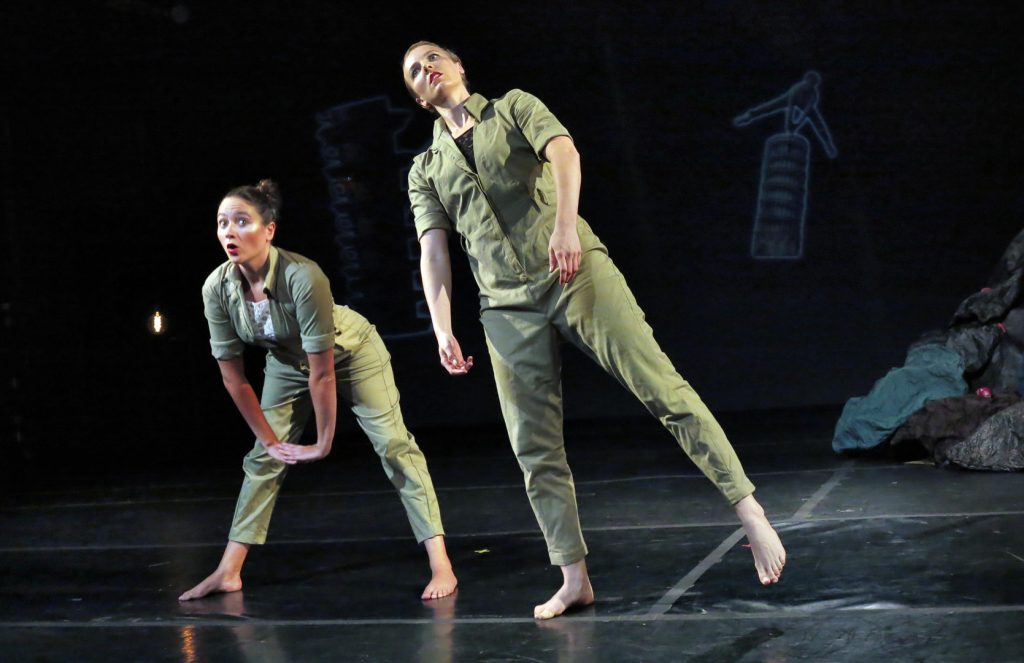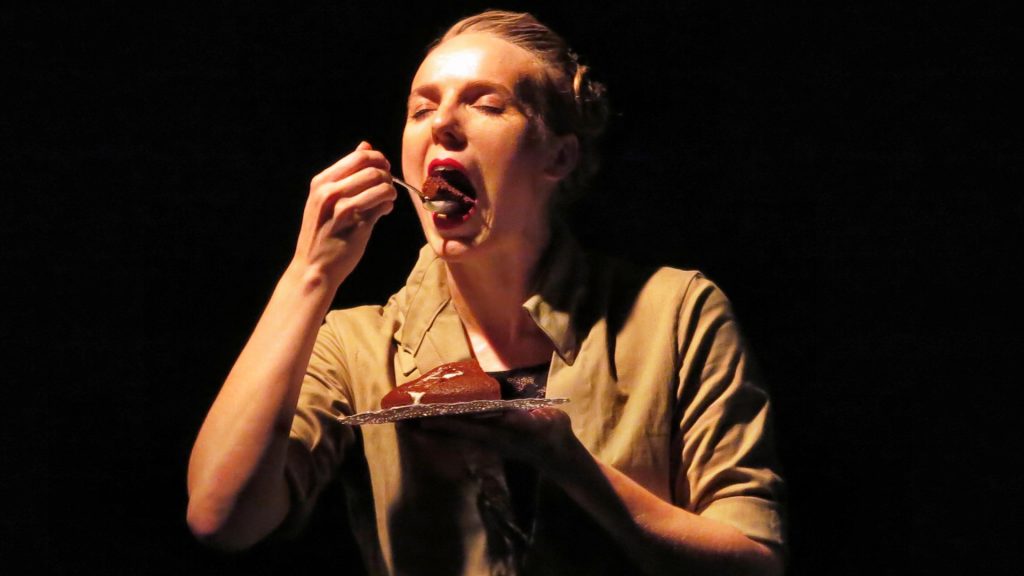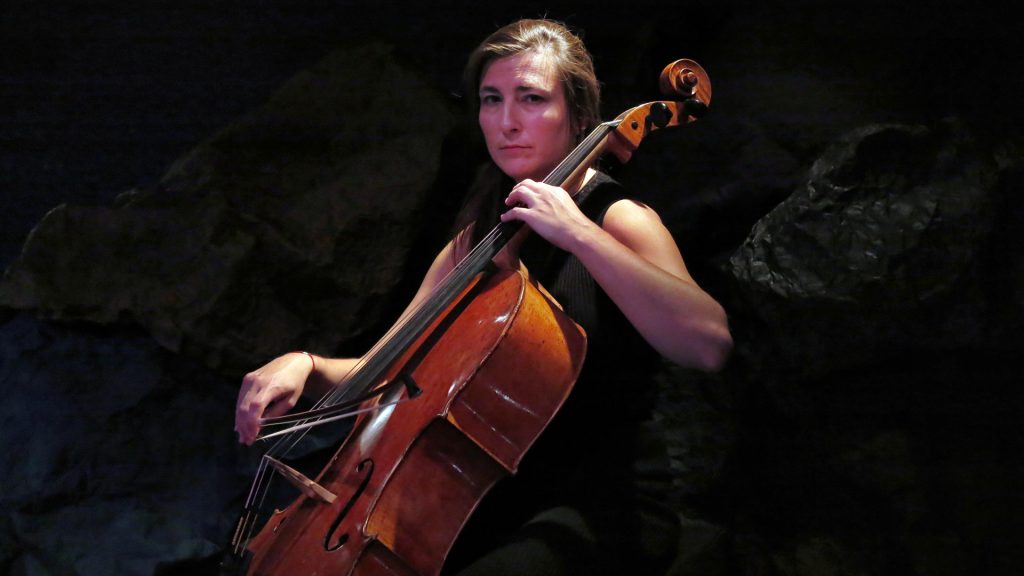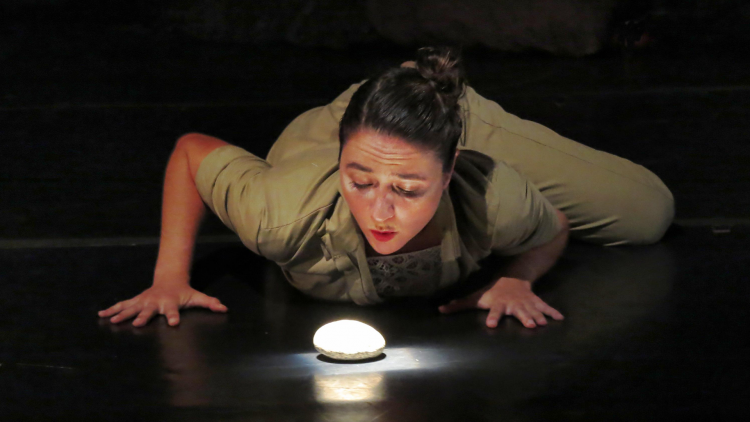A Nobel laureate, a cellist, two actors, three languages—it sounds like a list from one of Polish poet Wisława Szymborska’s lyrical flights of irony. On the surface the recipe promises a reverential homage to a Great Writer, the kind of soufflé savored by schoolteachers and cultural attachés and roundly parodied by exiled Polish writer Witold Gombrowicz in Ferdydurke and his inimitable Diary.
But nothing is what it seems in Open Heart Surgery’s “This Is Why We Live,” at La Mama through September 29. A random squiggle like an inadvertent screen saver resolves into a portrait of the poet. A rocky outcrop sheltering virtuoso cellist Dobrochna Zubek all but screams reverence and romanticism, flanked as it is by sprawling bodies like washed up corpses. But are those onions at her feet? And when Zubek’s soulful playing fades and bright lights come up on Lecoq-trained Alaine Hutton and Elodie Monteau, now alive and hilariously animated, it becomes clear that director Coleen MacPherson is aware of our expectations and skilled at subverting them.

Of course it helps that the poetry itself is deliciously subversive. Szymborska’s pen bursts the glistening, lumbering soap bubbles of Big Ideas, preferring instead to scratch the surface of the seemingly mundane and find layer after layer of deeper meaning. Her poem in celebration of an onion is a prime example: “Our skin is just a cover-up / In an onion there’s only onion.” Hutton and Monteau inject so much joie de vivre into their halves of the onion, their French and English renditions, that when the halves and languages come together at the poem’s climax, it’s as if a new life is conceived.
Another fine moment is Monteau’s “Conversation with a Stone,” performed in French with English supertitles. Not only does Monteau make the proverbial stone speak to comic effect, but she projects onto it a personality so believable that the interaction ultimately transcends comedy, leaving the audience to reflect on the loneliness inherent in the division between subject and object—arguably the poem’s whole point. Szymborska would approve.

The range of voices and moods in her poetry is broad, and MacPherson does an exemplary job of balancing contrasting elements and creating, if not a narrative through-line, then at least a satisfying sense of beginning, middle, and end. Sometimes the contrast is jarring, as when Hutton devours a piece of chocolate cake to the Brechtian title card “In Praise of Feeling Bad About Myself” and Monteau immediately follows with “Starvation Camp Near Jaslo,” as if to illustrate Chuck Palahniuk’s maxim: “A good story should make you laugh, and a moment later break your heart.” But the thread doesn’t end there; in an inspired repurposing, the cake crumbs eventually reappear as handfuls of dirt tossed on a grave in “Funeral II,” an amusing, incisive pastiche of characters, postures, and one-liners delivered with rapid-fire precision.
“This Is Why We Live” has sailed the globe, and it shows—in the confident performances, the layers of meaning, the economy of means. It’s a tight ship in no need of further tightening. However, there are a few moments that would benefit from slackening, from relaxing the focus on outward effect and allowing the actors to experience inwardly. This was especially true of “Starvation Camp Near Jaslo,” where the narrator’s suffering seems more indicated than felt. But even here, Szymborska’s words and Zubek’s music ensure that the spell remains unbroken.

All in all, a highly successful experiment proving poetry’s ability to transcend cultural and linguistic boundaries—and even make the leap from page to stage. The staging works so well, in fact, that I was surprised and disappointed to learn that unlike her contemporary Tadeusz Różewicz Szymborska never wrote for the stage. Toronto-based Open Heart Surgery does a great job of filling that gap in her résumé.
“This Is Why We Live” is running through September 29 at La Mama. For tickets and information visit lamama.org/why-we-live.

